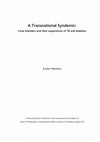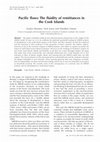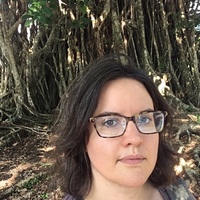Papers by Evelyn Marsters
Asia Pacific Viewpoint, 2006
... Debt repayment 5 43 500 Gifts New Zealand A ustralia $1200 Cook Islands Siblingsbrother Fath... more ... Debt repayment 5 43 500 Gifts New Zealand A ustralia $1200 Cook Islands Siblingsbrother Fatherdaughter Education 13 036 $6000 and gifts Dubai Daughtermother Travel Living expenses 53 000 Gifts A ustralia New Zealand Brotherbrother 7 40 000 Gifts ...

PhD Thesis University of Auckland, Dec 1, 2013
This thesis focuses on the influence transnationalism has upon the health of Cook Islanders. Cen... more This thesis focuses on the influence transnationalism has upon the health of Cook Islanders. Central to this enquiry is the relationship between Cook Islanders’ population mobility and the unequal burden of diseases such as TB and type 2 diabetes. The research explores the contextual and mechanistic impact transnationalism has within the Cook Islands TB and type 2 diabetes syndemic. I argue that a syndemic orientation to health research allows potential health risks to be investigated within a constellation of interacting biological, socioeconomic, cultural and political conditions. From the outset, TB and diabetes are considered to interact in ways beyond the biological, and harmful social conditions, to act synergistically to increase the burden of disease.
This research is significant and timely because the type 2 diabetes epidemic has recently been acknowledged as a significant factor in accelerating the rate of TB globally, and in the Western Pacific region. In simple terms, TB triggers diabetes or when diabetes is already present, diabetes acts as a risk factor for the development of TB. The interaction between TB and diabetes poses a particular threat for the Cook Islands population given suspected high levels of latent TB within older cohorts of the population and existing high levels of type 2 diabetes. Although current case numbers of TB are low in the Cook Islands and among Cook Islanders in New Zealand, this thesis provides evidence that active transmission of TB does exist. Drawing on empirical qualitative data drawn from interviews and observation this research is able to conclude that poverty, poor nutrition, stigma, delayed diagnosis and household overcrowding are significant factors that act synergistically within this syndemic to exacerbate illness.
Central to this research are the health and mobility stories of Cook Islanders who have experienced either or both diseases. In order to capture the transnational behaviours and the possible implications they have for their health, participants were interviewed in multiple locations in New Zealand and the Cook Islands. Purposively transnational in design, this research incorporates the perspectives of Cook Islanders living in the Pacific Islands of Aitutaki and Rarotonga, and the metropolitan suburbs of Avondale, Otara, Glen Innes and Porirua. It explores the transnational social field with regards to health and health service access for Cook Islanders in each of these places. The complexities of health and mobility stories lend themselves to narrative analysis and pictograms as a way of illustrating that a Cook Islands TB-diabetes-transnationalism syndemic exists.
That this syndemic exists leads to a discussion on the relationship between health, development and transnationalism. This debate throws light on the limitations of nation-centred approaches to health services and highlights both the linkages and gaps in health services for the Cook Islands population. By looking more deeply at the inherent connections between diseases it raises questions about the way in which health research is framed, who our research is for, and whether or not such a view is sustainable for the future.
Keywords: transnationalism, syndemics, New Zealand, Cook Islands, health, TB, type 2 diabetes

Asia Pacific Viewpoint, Apr 1, 2006
This paper contributes political and cultural-economy perspectives to the critique of the MIRAB m... more This paper contributes political and cultural-economy perspectives to the critique of the MIRAB model 20 years on. In it, we celebrate the politically grounded reading by MIRAB analysts of development in the small island nations of the Pacific and their attention to both the empirical and the structural in their treatment of the economies of these countries. We address aspects, however, of one of the common critiques of MIRAB analyses: their failure to capture accurately the nature of small island socio-cultural economies. We focus on the workings of remittance systems on two of the Cook Islands, Mauke and Manihiki, as the basis for a more thorough critique. We argue that rather than living economically and nationally determined lives, Cook Islanders live in rich networks of flows of goods, people, labour and meaning that the MIRAB model does not fully capture. The microeconomics of the transnational kin or household unit and the remittance decision are deeply embedded in such networks. These networks generate their own, temporary constellations of responsibility, economy and decision-making, which may or may not materialise at any point as household economy. We consider some of the consequences of a network view for MIRAB analyses and for development in small island nations.











Uploads
Papers by Evelyn Marsters
This research is significant and timely because the type 2 diabetes epidemic has recently been acknowledged as a significant factor in accelerating the rate of TB globally, and in the Western Pacific region. In simple terms, TB triggers diabetes or when diabetes is already present, diabetes acts as a risk factor for the development of TB. The interaction between TB and diabetes poses a particular threat for the Cook Islands population given suspected high levels of latent TB within older cohorts of the population and existing high levels of type 2 diabetes. Although current case numbers of TB are low in the Cook Islands and among Cook Islanders in New Zealand, this thesis provides evidence that active transmission of TB does exist. Drawing on empirical qualitative data drawn from interviews and observation this research is able to conclude that poverty, poor nutrition, stigma, delayed diagnosis and household overcrowding are significant factors that act synergistically within this syndemic to exacerbate illness.
Central to this research are the health and mobility stories of Cook Islanders who have experienced either or both diseases. In order to capture the transnational behaviours and the possible implications they have for their health, participants were interviewed in multiple locations in New Zealand and the Cook Islands. Purposively transnational in design, this research incorporates the perspectives of Cook Islanders living in the Pacific Islands of Aitutaki and Rarotonga, and the metropolitan suburbs of Avondale, Otara, Glen Innes and Porirua. It explores the transnational social field with regards to health and health service access for Cook Islanders in each of these places. The complexities of health and mobility stories lend themselves to narrative analysis and pictograms as a way of illustrating that a Cook Islands TB-diabetes-transnationalism syndemic exists.
That this syndemic exists leads to a discussion on the relationship between health, development and transnationalism. This debate throws light on the limitations of nation-centred approaches to health services and highlights both the linkages and gaps in health services for the Cook Islands population. By looking more deeply at the inherent connections between diseases it raises questions about the way in which health research is framed, who our research is for, and whether or not such a view is sustainable for the future.
Keywords: transnationalism, syndemics, New Zealand, Cook Islands, health, TB, type 2 diabetes
This research is significant and timely because the type 2 diabetes epidemic has recently been acknowledged as a significant factor in accelerating the rate of TB globally, and in the Western Pacific region. In simple terms, TB triggers diabetes or when diabetes is already present, diabetes acts as a risk factor for the development of TB. The interaction between TB and diabetes poses a particular threat for the Cook Islands population given suspected high levels of latent TB within older cohorts of the population and existing high levels of type 2 diabetes. Although current case numbers of TB are low in the Cook Islands and among Cook Islanders in New Zealand, this thesis provides evidence that active transmission of TB does exist. Drawing on empirical qualitative data drawn from interviews and observation this research is able to conclude that poverty, poor nutrition, stigma, delayed diagnosis and household overcrowding are significant factors that act synergistically within this syndemic to exacerbate illness.
Central to this research are the health and mobility stories of Cook Islanders who have experienced either or both diseases. In order to capture the transnational behaviours and the possible implications they have for their health, participants were interviewed in multiple locations in New Zealand and the Cook Islands. Purposively transnational in design, this research incorporates the perspectives of Cook Islanders living in the Pacific Islands of Aitutaki and Rarotonga, and the metropolitan suburbs of Avondale, Otara, Glen Innes and Porirua. It explores the transnational social field with regards to health and health service access for Cook Islanders in each of these places. The complexities of health and mobility stories lend themselves to narrative analysis and pictograms as a way of illustrating that a Cook Islands TB-diabetes-transnationalism syndemic exists.
That this syndemic exists leads to a discussion on the relationship between health, development and transnationalism. This debate throws light on the limitations of nation-centred approaches to health services and highlights both the linkages and gaps in health services for the Cook Islands population. By looking more deeply at the inherent connections between diseases it raises questions about the way in which health research is framed, who our research is for, and whether or not such a view is sustainable for the future.
Keywords: transnationalism, syndemics, New Zealand, Cook Islands, health, TB, type 2 diabetes